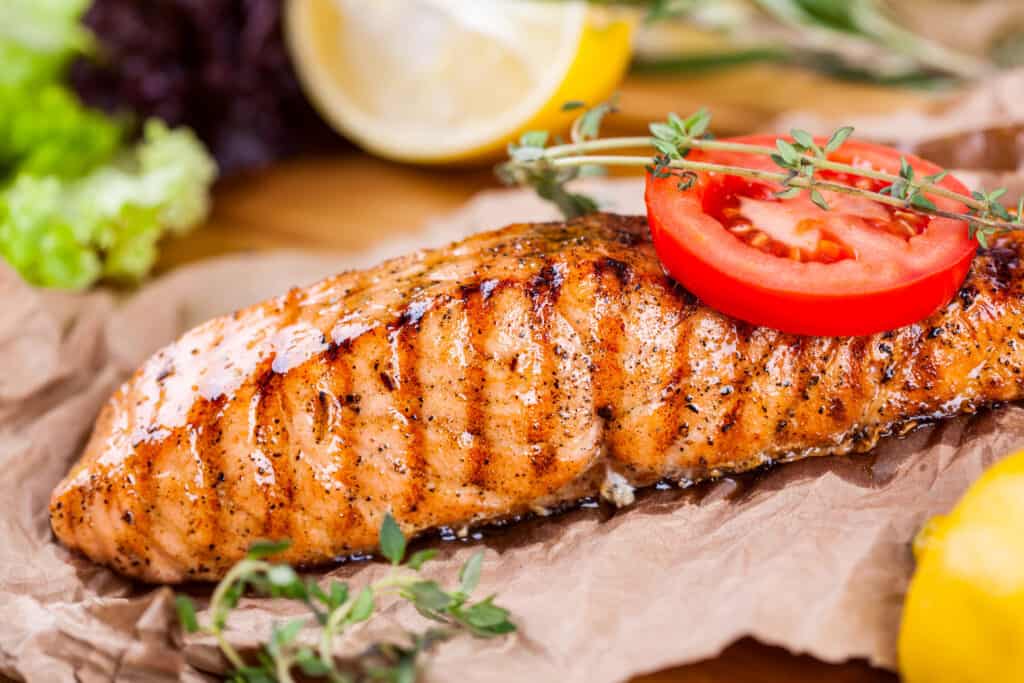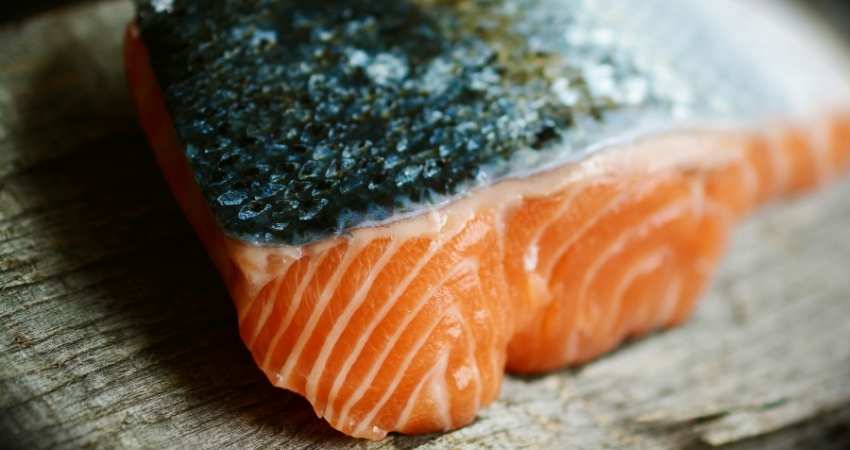A Guide To Farm Raised Salmon – Is It Organic?
More and more people are trying to find the healthiest and best ways of consuming essential food like salmon. Therefore, In this article, we’ll be answering the question: Can farm-raised salmon be organic?
Farm-raised salmon cannot be organic. The United States Department of Agriculture currently provides no classification for what makes salmon organic. Outside the United States, some salmon farmers raise farm-raised salmon considered to be organic.
As a Certified Health Coach many people ask about organic and farm-raised foods including salmon. Therefore, I have researched this topic extensively. All of your questions regarding farm-raised salmon and whether or not it is organic, will be answered. Therefore, keep reading.
Is Farmed Raised Salmon Organic?

To understand whether or not farm-raised salmon is organic, we first need to consider what classifies something as “organic.”
In order for something to be classified as organic, it needs to be done so by the USDA. The USDA has no classification for what makes salmon organic. Therefore, farm-raised salmon is not organic. However, there is salmon farmed in open catches considered to be organic.
For more than a decade, the USDA has been moving toward allowing the sale of organic, U.S. made seafood1. In addition to salmon, other organic seafood may include, clams, mussels, oysters, shrimp, catfish and tilapia2.
Although there’s delays and issues, I am sure it won’t be long until the USDA comes up with the classification for what makes salmon organic. Other countries like Canada and Europe have been exporting their own organic products.
Until then, when you see salmon being advertised as organic, it was probably raised in open catch nets instead of in enclosed bodies of water.
Is Organic Farm Raised Salmon Safe?
This is a question asked quite a lot. Now we’ve determined what makes organic salmon, organic, it’s important to address the question whether or not organic farmed salmon is safe. The answer might surprise you.
Compared to wild salmon, farm-raised salmon contains a lot more contaminants3. With that being said, currently, there’s no evidence that organic salmon is any healthier than farm-raised salmon. If you think about it, this is probably because there still is no real classification for organic salmon.
It all boils down to how the salmon farmers raise their salmon. In a previous article, it was discussed how the food a salmon is fed can determine whether or not it has any contaminants. In that article, Worms In Your Farm Raised Salmon? Facts & Myths Revealed, it was determined that farm-raised salmon should never be fed fish.
There doesn’t seem to be any way an organic salmon can be less healthy than regular farm-raised salmon. Therefore, in terms of whether or not it’s safe, organic farm raised salmon is as safe as any other farm-raised salmon.
With that said, many people still say wild salmon is still the best salmon you can get. I Totally agree, I always buy wild caught salmon.

What Is The Difference Between Organic And Non-Organic Farmed Salmon?
This is another question I get asked very often and the answer to this one is pretty simple. We already know wild salmon cannot be organic, and the classification for organic farm salmon is not yet available4. There is a difference between organic and non-organic farm-raised salmon.
Non-organic farm-raised salmon are stored or housed in enclosed bodies of water. Organic farm-raised salmon is housed in open net catches. Therefore, the population density is less for organic salmon. In addition, organic salmon is raised alongside other sea creatures.
Other than that, there is no big difference between organic farm-raised salmon and non-organic farm-raised salmon. They still get fed the same food and both methods have their downsides.
There is evidence that organically farmed salmon could be worse for the environment than housing the salmon in enclosed bodies of water.
Does Organic Farm Raised Salmon Have Mercury?
Organic salmon is salmon that has been farmed in certain conditions. Whether or not salmon has Mercury, depends on what that salmon has been eating. So, let’s jump straight into it.
Both farm raised salmon and wild caught salmon contain a certain level of mercury. However, there is some good news. The levels of mercury found within salmon have drastically decreased and will continue to do so.
New methods and technologies are constantly coming out which are allowing salmon farmers to raise better salmon. With all of this being said, you might find different farms supply different qualities of salmon.
Therefore, you can never have a guarantee your salmon will contain the lowest possible amount of mercury5.
Does Organic Salmon Have Toxins And PCBs?
Another concern with salmon, alongside whether or not it has Mercury, is whether it contains other PCBs and toxins6. I’ve covered a similar concern about bacteria in canned or frozen salmon which you can read about right here, Frozen Salmon vs. Canned Salmon: Which is Healthier?
Salmon and farm-raised salmon can contain trace amounts of PCBs and toxins. The trace amounts are low unless you consume copious amounts of salmon. Therefore, they will have little to no effect.
It’s important to note, almost anything you consume needs to be done in moderation. This is the reason why the trace amounts of mercury, PCBs, and other toxins will have very little effect on you.
Although, there are studies showing possible concern over health risks associated with farm raised7.
Disclaimer: Some of links in this article are affiliate links which means I may earn a small commission at no extra cost to you. As an Amazon associate I earn from qualifying purchases.
Should You Eat Organic Farm-Raised Salmon?
If you enjoy seafood, you probably enjoy salmon. If you enjoy salmon more than most other kinds of seafood, you might be wondering whether you should be eating it, especially if you have any health concerns. In this section, this is the question that we are going to answer.
It is recommended to include fish in your diet, and the amount differs per publication. The general consensus is fish should be consumed twice a week.
Salmon should be consumed whether it’s farmed, organic, or wild, but wild caught is your best option.
Salmon Keto Diet Tip: Salmon is high in fat and protein making it a perfect choice for a keto diet. One of the biggest reasons for failing a Keto diet is not having a plan. Simply follow this plan for only 28 days, The 28-Day Keto Challenge and you can Succeed!
If you have any questions to ask me about this article don’t hesitate to comment below or email us. You can find an email on our contact page.
Read Next – More Healthy Food Articles
Can Mushrooms Be Eaten raw? A Scientific Look
Is It Better To Eat Broccoli Raw Or Cooked?
Can Pomegranate Increase Weight? Facts And Myths Revealed
- USDA: Organic Aquaculture [↩]
- PBS: USDA to propose standards for organic seafood raised in U.S. [↩]
- The Cornucopia Institute: Why Don’t You See Organically Labeled Fish? [↩]
- The Washington Post: Organic Salmon? Says Who? [↩]
- National Center for Biotechnology Information: A survey of metals in tissues of farmed Atlantic and wild Pacific salmon [↩]
- EPA: EPA-FDA Advice about Eating Fish and Shellfish [↩]
- National Center for Biotechnology Information: Global assessment of organic contaminants in farmed salmon [↩]
